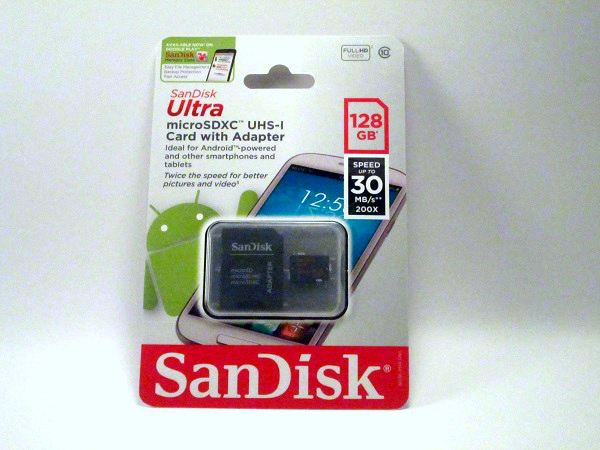Names that you often recognize in the memory card world are Kingston, Samsung, Leef and SanDisk. At least in my mind those are the ones that frequently come to mind. Each company has a variety of card sizes, storage sizes, speed options and price tags. Choosing the right card for what you need or want is often more important that choosing one based on the price tag. 8 and 16 GB cards are a dime a dozen any more. Even 32GB cards are starting to hover at acceptable price tags for the average consumer. Being a bit of a storage junky I found myself rather curious about moving beyond the more traditional 32 and 64GB cards and was able to secure one of SanDisk’s latest releases, a 128GB Micor SDXC UHS-1 card.

- A SanDisk Ultra 128GB Micro SDXC UHS-1 micro SD card
- A micro to full sze SD card converter card
- Plastic case
It would be a bit redundant to dig out the physical size and weight of the card, so I won’t even go there. However, I do need to cover some of the details that SanDisk lays out for us. While the card is 128GB’s, you should know that you don’t have access to the whole amount. Â You actually get to use about 119GBs. That is still quite a lot of space regardless. The card is water proof, temperature proof, shock proof and x-ray proof, as is most high-end SD cards now a days. SanDisk and the packaging put the cards speed at up to 30MB/s read speed, with a lower write speed. Those numbers are based on internal testing and are usually a below average performance rating.

For some the speed is more important than the actual memory size. Rightfully so depending on your real world needs. I ran a number of CrystalDiskMark scans on the card on both a USB 2.0 and USB 3.0 connection with a USB 3.0 compatible micro SD card reader to see what speeds I was able to achieve. Here are those results, with the USB 2.0 test first followed by the USB 3.0 test.


The biggest surprise that came from my use of the card was its compatibility. General consumers, and sometimes myself included, take what a manufacturer states is the “Max storage size” for a particular device. For instance, the new HTC One M8 is targeting their marketing with the “up to 64GB” additional storage via a micro SD card. In my case I have a Sony Xperia Z which is stated to support “up to 32GBs” additional storage. To my surprise when I stuck the SanDisk 128GB card into my device for the heck of it, I found that it read the full thing just fine.



It makes me wonder how many other devices out there support larger cards, but just don’t state it because of testing, lack of testing or marketing. I did however, slide it into the Lenovo Yoga 8 and Yoga 10 and neither one of those would read the card. Unfortunately those are all the devices I have available to test the card in for additional compatibility. It is compatible with the SanDisk Connect Wireless 64GB thumb drive that I reviewed earlier, but it won’t work in the 32GB or 16GB versions of the drives.
Couple the SanDisk 128GB with a full size card converter and you have large capacity card that can traverse between multiple compatible devices including phones, tablets, cameras and laptops/PC’s.
The bigger question is what the bottom line will be for you to buy one. The SanDisk 128GB Ultra is available at Amazon and Best Buy currently. Both online retailers have them listed as out of stock. Oddly enough, there is pretty dramatic price gap between the two. Best Buy has the card listed at $199.99 while Amazon has it for $119.99. your best bet is clearly waiting for it to reappear on Amazon and save yourself $80.








